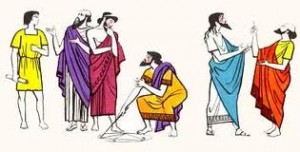Site about Music - Art & Math


 Mathematics has plays an invaluable role in biology, physics, chemistry, economics, sociology, and engineering. Mathematics allows us to build spaceships and investigate the geometry of our universe.
Mathematics has plays an invaluable role in biology, physics, chemistry, economics, sociology, and engineering. Mathematics allows us to build spaceships and investigate the geometry of our universe.
Ancient mathematics has reached the modern world largely through the work of Greeks in the classical period, building on the Babylonian tradition. A leading figure among the early Greek mathematicians is Pythagoras.
The study of mathematics as a subject in its own right begins in the 6th century BC with the Pythagoreans, who coined the term "mathematics" from the ancient Greek μάθημα (mathema), meaning "subject of instruction".
Greek mathematics greatly refined the methods and expanded the subject matter of mathematics.
Chinese mathematics made early contributions, including a place value system.
The Hindu-Arabic numeral system and the rules for the use of its operations, in use throughout the world today, likely evolved over the course of the first millennium AD in India and were transmitted to the west through the work of Muḥammad ibn Mūsā al-Khwārizmī.
Many Greek and Arabic texts on mathematics were then translated into Latin, which led to further development of mathematics in medieval Europe.
From ancient times through the Middle Ages, bursts of mathematical creativity were often followed by centuries of stagnation.
Beginning in Renaissance Italy in the 16th century, new mathematical developments, interacting with new scientific discoveries, were made at an increasing pace that continues through the present day.
During the Renaissance, the development of mathematics and of accounting were intertwined.
The 17th century saw an unprecedented explosion of mathematical and scientific ideas across Europe. Galileo observed the moons of Jupiter in orbit about that planet, using a telescope based on a toy imported from Holland.
Isaac Newton discovered the laws of physics explaining Kepler's Laws, and brought together the concepts now known as calculus.
In addition to the application of mathematics to the studies of the heavens, applied mathematics began to expand into new areas, with the correspondence of Pierre de Fermat and Blaise Pascal. Pascal and Fermat set the groundwork for the investigations of probability theory and the corresponding rules of combinatorics in their discussions over a game of gambling.
The most influential mathematician of the 18th century was arguably Leonhard Euler. His contributions range from founding the study of graph theory with the Seven Bridges of Königsberg problem to standardizing many modern mathematical terms and notations. For example, he named the square root of minus 1 with the symbol " ί ", and he popularized the use of the Greek letter " π " to stand for the ratio of a circle's circumference to its diameter.
The 19th century saw the beginning of a great deal of abstract algebra. Hermann Grassmann in Germany gave a first version of vector spaces, William Rowan Hamilton in Ireland developed noncommutative algebra. The British mathematician George Boole devised an algebra that soon evolved into what is now called Boolean algebra, in which the only numbers were 0 and 1. Boolean algebra is the starting point of mathematical logic and has important applications in computer science.
The 20th century saw mathematics become a major profession. Every year, thousands of new Ph.D.s in mathematics were awarded, and jobs were available in both teaching and industry.
( from https://en.wikipedia.org/wiki/History_of_mathematics )

According to legend, the way Pythagoras discovered that musical notes could be translated into mathematical equations was when he passed blacksmiths at work one day...
Read the full story »
Greek mathematics, as that term is used in this article, is the mathematics written in Greek, developed from the 7th century BC to the 4th century AD around the shores of the Eastern Mediterranean.